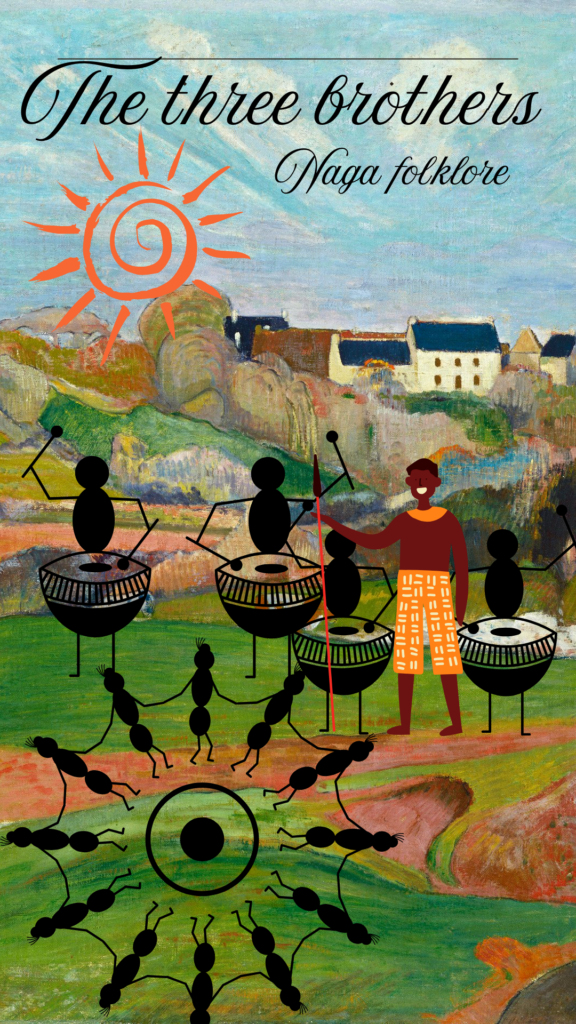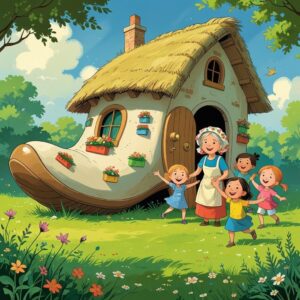

Summary and Analysis
Adopted from Naga folktale, ‘The Three Brothers’ tells the story of- Tanyen, Zhoshu, and Penhun, who live in a small village where they inherit farmland and a cottage. Tanyen, the eldest, is diligent and works hard all day on the farm to provide for his family. Meanwhile, his brothers only eat and sleep. They are self-serving and lazy. Eventually, Tanyen realized the gravity of the situation and understood his incapability to assuage the family with his humble income. Frustrated, he resolves to travel to a foreign land to search for fortune and success. His younger brothers, however, vehemently oppose his idea. They were jealous of the Possibility of Tanyen becoming rich before them. They pretend to have realized their responsibility and offered to go first. Zhoshu left home, and after wandering all day, he finally reached a foreign village. Exhausted, he begged for shelter and food from an elderly lady living in a hut. The lady promised to shelter him if you could remove all the stars from the pool, meaning the reflection of the stars. Zhoshu believed the task was impossible. He left the place immediately and returned home, complaining he could not find his fortune. Penhun left next and reached the same village where he met the same elderly lady from before who gave him the same task. Penhun also moaned at the impossibility of the task and left for home disappointed. Finally, it was Tanyen’s Turn, and when the elderly lady told him to extract all the stars from the pool, he only asked for a bucket and started draining water from the pool. He drained the pool until it was almost dry. The elderly lady was very pleased with his determination and rewarded him with a big farm. Tanyen became rich overnight and went back to surprise his brothers. When they inquired about the secret behind his success, Tanyen replied that he found it in his own hands. The younger brothers finally recognized the importance of hard work. They decided to work hard from that day forward and lived happily for the rest of their life.
The story of the three brothers is a classic example of the agrarian Naga value. It exemplifies how labor is essential to survival and prosperity. It assesses the virtues and vices of the brothers’. The eldest is diligent and considerate. Meanwhile, his brothers are idle, self-serving, and jealous. When each of them is allowed an opportunity to succeed, the idle brothers find it difficult and surrender without even trying. Tanyen, with his diligence and strong determination, attempts the task at hand and succeeds, proving himself worthy of rewards. The story beautifully pits diligence against idleness. The stars in the pool symbolize unattainable dreams if met with no effort. Tanyen realizes his unattainable dreams through his determination and persistence. He transforms the lives of his younger brothers’ by setting a good example. It reinforces the moral value that effort yields results.
source : Naga Tales ( youtube channel)
Answer the following questions.
- Why did Tanyen want to go out and seek his fortune? Tanyen was frustrated with his brothers’ idleness and struggled to assuage the family. That’s why he resolved to travel to a foreign land to seek fortune and prosperity.
- Why did Zhoshu and Penhun not like Tenyan’s idea? What does this tell us about their nature ? Zhoshu and Penhun were both idle and self-serving. They were incredibly jealous of the Prospect of Tenyan becoming rich before them. So they tried to dissuade him from his decision.
- Why did Zhoshu and Penhun fail to earn anything? The two brothers Zhoshu and Penhun were both very lazy. They did not want to make any effort and surrendered before starting.
- What helped Tanyen earn his fortune? Tanyen’s hard work and determination earned him his fortune.
- How did thevold woman reward Tanyen? Why did she do so? Tanyen emptied the pool of all the water with a bucket within a night, fulfilling his task of extracting the stars from the pool. The elderly lady, a recurring figure of folktales, is a trickster, testing the moral fibers of the brothers’ nature and bestowing her rewards to the worthy.





